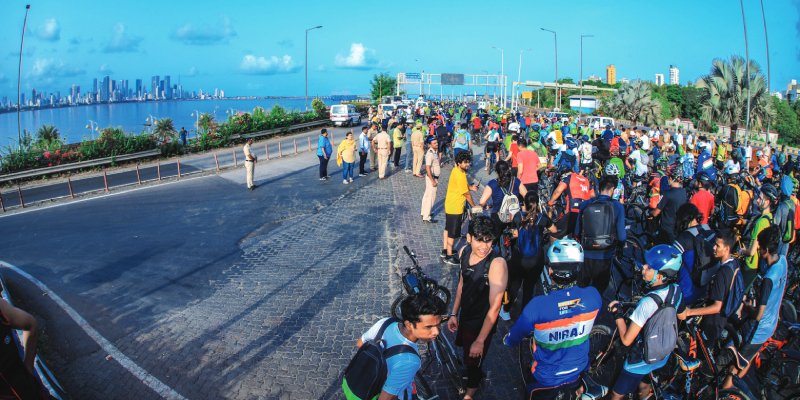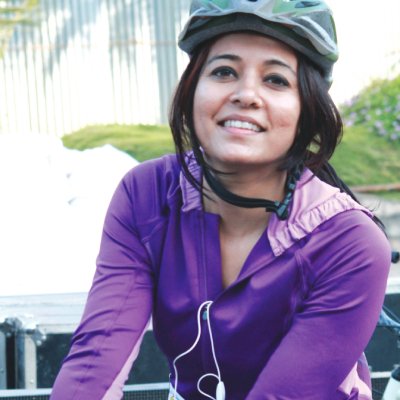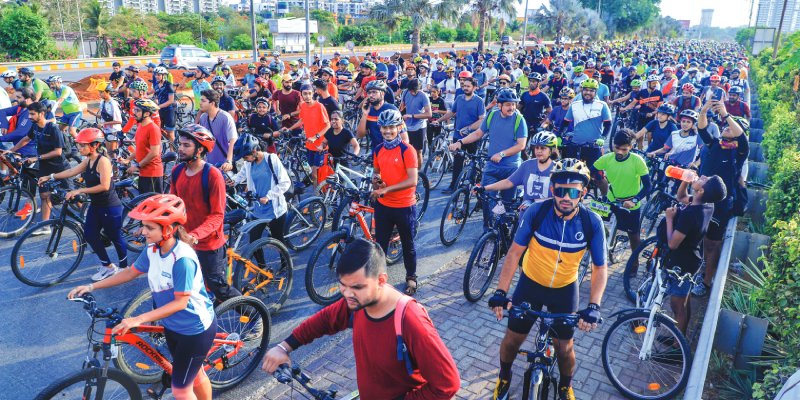Firoza Suresh, Mumbai’s Cycle bicycle enthusiast has pledged to make cycling the most sustainable way to commute- not just for health, but also to work and leisure. With the Smart Commute Foundation – Cycle2Work | MeCycleRider initiatives, she has been motivating Mumbaikars to take to bicycles. Firoza spoke to Mangala Chandran about her bicycle journey- as a school girl to now the Bicycle Mayor of Mumbai.

How did your love for bicycle start?
“My childhood, in a non-digital age, gave a lot of opportunity to be outdoors. Cycle was one of the ways for us to play outdoors. With a meagre pocket money, I used to rent bicycles and go for my rides. So that was part of the growing up. Later, the bicycle rides also helped save money; however, the concept of environmental protection did not figure anywhere then!
As one entered the phase of higher classes and college, one was also reminded of a particular dress code but I stood my ground. After college and into a family life of my own, things started changing. I got back to cycling. By 2009, International Brands had also come in. I invested in an expensive brand and started cycling alone and in groups for leisure.
The next phase of my ‘bicycle journey” was quite significant. Staying in Juhu, I commuted to work in Dadar- a 12km ride. Initially I used the cycle for first and last mile connectivity by using train for in between journey. But getting in and out of train was a task inconveniencing many, so I did all the 12km on cycle itself saving time in the process. Of course, the parking problem existed then too.
I have had the experience being on the ground. There was an organic growth as I went on. The parking problem made me invest in a folding bicycle, which many Mumbai cyclists might not have thought of then.
I have always believed in cycling to work. So, in 20I2, for the first time, we did a bicycle flash mob opposite Bandra railway station. And initiated a conversation to promote cycling to work.

If you need to bring about a change, you need to communicate, discuss and bring in some kind of intervention. I started the conversation in 2012
But what was the infrastructure then? Cycling on the road or on pavements?
We shared the road with the motorized transportation, we didn’t think much at that point in time that infrastructure was so much of a problem, because we grew with that infrastructure. There are potholes on the road, there’s no footpath, and there were encroachments on footpaths. You have embraced the city as it is and maneuvered through garbage & debris and moved forward.
In 2013, we approached the dabbawallas on the World Environment Day. Because, they were the ones cycling to work over a century. We organized a critical mass event – a ride from BKC to Bandra Carter road. Again, this was not pre-planned, it was all something that was happening organically.
In 2014 we planned a cycle to work event on a Friday morning. I met Urban and Transport Planners and the people who are in the academia to understand the right language to speak. And the right forums to be in. The media was speaking about Amsterdam, about Copenhagen, and they used to mention about Salman Khan going on a bicycle everywhere. The cycle hype had started. So for the first cycle to work event, Sofitel agreed to be the venue partners, because that was the mid-point where we could call all the Mumbaikars across Mumbai and get them to take a pledge that they would cycle to work at least once a week.
To our surprise, 350 people from far and wide turned up. With thought leaders around, more clarity emerged for the campaign for cycle to work, what followed had been the beginning of conversation of protecting the environment.
One hurdle was the reluctance by the Corporate houses that did not want their employees to cycle to works because of safety concerns. There were no proper cycle tracks, no shower facility in the offices and no parking facilities. The minimum requirements were a cycle stand, basic road infrastructure and so the dialogue had to be on these.
For the 2015 event, around 500-600 cyclists assembled at Sofitel. In 2016 it was good, because for the first time, the Municipal Commissioner came for our event. And over 1200 cyclists turned at the hotel. The same year, I formed my own NGO and dedicated myself completely for promoting cycling. Municipal Commissioner Ajoy Mehta initiated the first pop-up cycle lane from NCPA to Chowpatty in 2017.
My trip to Amsterdam to speak at a conference gave an insight into how cycling is supported internationally. Back home, I realized that in spite of having 51% of people walking/ Cycling, more importance was given to motorized transport. The funds were definitely not going towards walking and cycling.
Since then, my focus has shifted to walking and cycling. We are a walking city. We still need to introduce public bike sharing which is needed, but again, the public road infrastructure is not that good, because if you are getting people out, even in public bike sharing, then they need to be disciplined they need to also follow traffic rules.
So we came up with the pop-up bicycle lane and we named it Pedal up Mumbai. I also travelled to Brazil, San Paolo and Rio and was amazed by the way they had promoted cycling.

So where does Mumbai stand compared to the other cities.
I think the game changer for everybody was Covid across the globe. I would say, if Covid did not happen, we would be still struggling to boldly to put up the caption to make Mumbai the cycling capital by 2030. We could put up this bold statement only during Covid when we started the Cycle Chala City Bacha Campaign and worked towards building capacity. We had kept up the momentum with 40% increase in cycling and we appointed bicycle councillors in each ward. Now we can proudly say, that we can become a cycling capital of India, because we also nurtured the livelihood cyclists.
There are 12 million people who live in the slums area in Mumbai. It was necessary to start conversation with them and that’s where we started the Me Cycle Rider. We donated used bicycles to kids staying in the slums. And they adapted to cycling very quickly unlike more privileged children. During Covid, the house-help had a lot of problems with travelling. So we started training them. We picked up 50 women and we trained 35 already. So every ward of Mumbai, we will pick up 50 women, as we kept a target of 1200 women. My personal commitment is to train 1200 women across Mumbai with no cost taken from them.
It is important not only to create the infrastructure, but also to nurture ridership by creating programmes events and expos. We need to have a clear time line, a clear agenda to work and public participation. We need a good combination of hardware and software.
What is the current status?
The current status is that yes, there is a huge critical mass across Mumbai to be nurtured; our plan of action after this, after the huge success of Pedal Up, where we had close to 6000 cyclists, is again in a software space. Achieving this after Covid is a very great thing. I am proposing a ward wise Pedal Up. If we get one lakh cyclists, that would be the game changer.
 TrafficInfraTech Magazine Linking People Places & Progress
TrafficInfraTech Magazine Linking People Places & Progress

